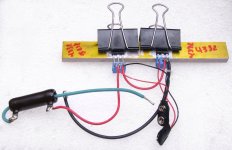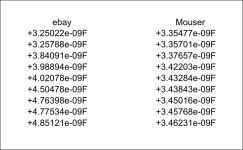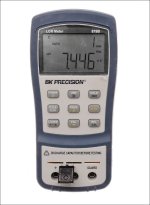Does anyone here want to help in trying to unmask the defaced FETs that you find in some amplifiers? The following is what you'd need for basic testing. Having this work distributed to a large number of techs could defray costs and tests of the same FETs by different techs could help confirm values.
A 12v power supply
A 2 ohm (other values would work but a standard 2 ohm would simplify) dummy load or current limiting resistor (25w or larger)
A way to accurately measure current (any multimeter capable of measuring 10 amps is good enough)
A standard multimeter to measure DCV.
Some form of heatsink to clamp the FET to during testing
A 12v power supply
A 2 ohm (other values would work but a standard 2 ohm would simplify) dummy load or current limiting resistor (25w or larger)
A way to accurately measure current (any multimeter capable of measuring 10 amps is good enough)
A standard multimeter to measure DCV.
Some form of heatsink to clamp the FET to during testing
Hi Perry,
I'll gladly help as I come across any. I'm hoping to not need to remove the board I'm currently working on from the heat sink, but if I do, I can remove one of these and we can test.
I'll gladly help as I come across any. I'm hoping to not need to remove the board I'm currently working on from the heat sink, but if I do, I can remove one of these and we can test.
If you're going to test (as a last resort if something goes horribly wrong), grab a new copy. There have been multiple edits/additions since your last DL.
That's a given, it's a higher rated FET. But I'm referring to the fet is in a state that's not to spec but still functional. Like for instance, I'm fixing a bunch of Taramps DS 1200X4 and they use the 5620, as you know, they're in various states of damage.
When I use my DMM to test the FETs for shorts and also to turn them on in diode mode to see if they're conducting, and they do pass the test... But! When I test them with the cheapo LCR tester it tells me a different story.
The ones that I would consider good are the ones with a very low RDS, like .1 up to .9. but there's 5 bunches...
When I use my DMM to test the FETs for shorts and also to turn them on in diode mode to see if they're conducting, and they do pass the test... But! When I test them with the cheapo LCR tester it tells me a different story.
The ones that I would consider good are the ones with a very low RDS, like .1 up to .9. but there's 5 bunches...
To test low RDSon FETs, you need to run more current through them and measure the values accurately then use R=V/ I (simple Ohm's Law) to find the resistance. The diagram may be overwhelming but the test jig shows how simple it is. You simply limit current (I used a resistor) and measured the voltage and current. Then made the calculations. Garbage quality FETs will read significantly different. Good FETs will read relatively close. The tests include a reference FET so that you can see that the test conditions were consistent. The 24N40 shows what to expect from a garbage FET. The other FETs were from reputable distributors.
You can also compare capacitance if you have a reliable capacitance meter. The two columns of values show the FETs from one reliable distributor and one that you're warned to never use.
You can also compare capacitance if you have a reliable capacitance meter. The two columns of values show the FETs from one reliable distributor and one that you're warned to never use.
Attachments
You can also compare capacitance if you have a reliable capacitance meter. The two columns of values show the FETs from one reliable distributor and one that you're warned to never use.
What's unclear?
What's unclear?
Ohhhhh! I understand now, thank you.
Semiconductors like transistors and ICs I purchase from Digikey. But is it okay to purchase resistors and diodes from AliExpress?
Semiconductors like transistors and ICs I purchase from Digikey. But is it okay to purchase resistors and diodes from AliExpress?
You have to decide on the sources but if a reputable distributor sells locally (no excessive shipping), that's what I'd use.
That's what I do, but the IRS2093 is not available locally, and just like the last time you helped me fix those amplifiers I had to purchase the ICs from Digikey.
Now I need a lot of 4.7Ω and 10Ω 0805 resistors, along with the SMD caps around the IC. The 22uf ones, when they fail (High ESR) there's no audio from the channel or it's very low and distorted.
In any case, I'm going to order a bunch of parts and I'm just wondering if I should just stick with Digikey for all parts or just for the chips.
Now I need a lot of 4.7Ω and 10Ω 0805 resistors, along with the SMD caps around the IC. The 22uf ones, when they fail (High ESR) there's no audio from the channel or it's very low and distorted.
In any case, I'm going to order a bunch of parts and I'm just wondering if I should just stick with Digikey for all parts or just for the chips.
- Home
- General Interest
- Car Audio
- Testing of defaced FETs





